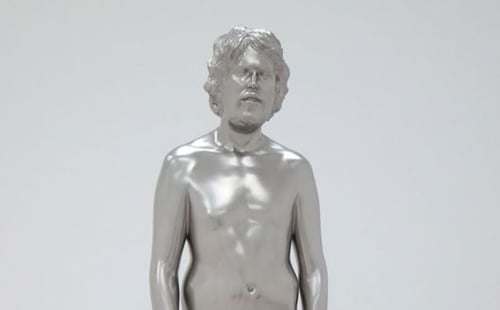
Ilse Haider, Mr. Big (2013).
Courtesy the Leopold Museum, Vienna.
Is the male body really so dull? Last week Guardian art critic Jonathan Jones published his latest in a series of listicles plundering art history for page-views, “The top 10 male nudes in art.” Aside from a couple of inspired picks—a Wolfgang Tillmans photo, Donatello’s David—it’s all very safe and predictable. Here, then, are artnet News’s 10 better male nudes.
Ilse Haider‘s Mr. Big (2013): The centerpiece of the Leopold Museum‘s controversial “Nude Men” exhibition—whose posters, featuring a Pierre & Gilles image of nude soccer players, were censored—became an improbable and irresistible photo op for visitors outside the Viennese institution.
Charles Ray, Young Man (2012).
Courtesy the artist and Matthew Marks Gallery.
Charles Ray‘s Young Man (2012): Though another of Ray’s full-scale male nudes met an ignomious end when Boy With Frog (2008) was removed from its canal-side perch in Venice, the artist has continued to develop his brand of hyperrealist statuary, most recently with a show of three solid stainless steel figures at Matthew Marks in late 2012. The most impressive of these, the nude and bearded Young Man, conjured the feeling of stumbling upon the “Hipster” display in a museum from the future.
David Altmejd, The Spiderman (2008).
Photo: j-No/Flickr.
David Altmejd‘s The Spiderman (2008): The fast-rising Canadian artist has been branching out into prismatic and fragmented mirror boxes filled with deconstructed figures and anthropomorphized objects, but his best-known works are still last decade’s exploding colossi. The partially decomposed Spiderman, with what looks like a portion of his nervous system jutting out of his torso, may be the most unsettling from that body of work.
Installation view of Paul McCarthy at SMAK, 2007.
Photo: lamazone/Flickr.
Most of Paul McCarthy‘s Work: More often than not, figures in McCarthy’s sculptures, videos, and labyrinthine installations are either nude or holding butt plugs. For his solo show at SMAK in 2007, he included two kinetic sculptures of male figures humping a tree and the floor, and in the next room both were laid out on tables, castrated.
Fernando Botero, Abu Ghraib 43 (2005).
Courtesy Marlborough Gallery.
Fernando Botero‘s Abu Ghraib Series (2005): The Columbian artist best known for his sculptures of endearingly curvy men, women, and animals tackled some uncharacteristically prickly subject matter in 2005 when he created a brutal series of paintings and drawings responding to the vile actions of US military offices at Iraq’s Abu Ghraib prison. “They may not be masterpieces, but that may not matter,” the New York Times‘s Roberta Smith wrote when Marlborough Gallery showed the works the following year. “They are among Mr. Botero’s best work, and in an art world where responses to the Iraq war have been scarce—literal or obscure—they stand out.
Nan Goldin, Joana dressing after the bath, Sag Harbor, NY (2001).
Courtesy the artist and Galería Javier López.
Nan Goldin‘s Joana dressing after the bath, Sag Harbor, NY (2001): Nudes of all genders abound in Goldin’s oeuvre, but few are as seemingly innocent and playful as this photo, which inverses the typical male-female power dynamic from art history.
Ron Mueck, Dead Dad (1996-97).
Photo: Lance/Flickr.
Ron Mueck‘s Dead Dad (1996–97): The Australian hyperrealist sculptor knows his way around the male anatomy like few other contemporary artists, but Dead Dad may be his most provocative and moving nude.
Egon Schiele, Seated Male Nude (2010).
Via Wikimedia Commons.
Egon Schiele‘s Seated Male Nude (1910): The Austrian artist painted and sketched more than his share of skeletal male nudes, many of them self-portraits, but this work made when Schiele was just 20—8 years before his death—beautifully articulates the pain and anguish running throughout his oeuvre.
Auguste Rodin, The Bronze Age (1875/76).
Photo: Jean-Pierre Dalbéra/Flickr.
Auguste Rodin‘s The Bronze Age (1875/76): The patriarch of modern sculpture may be best-known for another, more pensive nude figure—The Thinker—but his personification of the bronze age is by far his most erotically charged portrayal of a solitary male figure.
Jean Auguste Dominique Ingres, Study of a Male Nude (1801).
Via Wikimedia Commons.
Jean Auguste Dominique Ingres’s Study of a Male Nude (1801): It may be a mere study technically, but this strategically cropped half-length portrait of a young man is a testament to the diverse anatomical expertise of an artist best-known for painting nude women with very, very long backs.